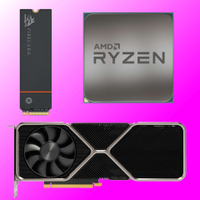The US Senate has finally voted to move along with legislation that provides billions of dollars in subsidies and tax credits for semiconductor manufacturing in the US. In its current form, the CHIPS Act is a slimmed-down version of the bill introduced last year that has since stalled in Congress (though the name, the Creating Helpful Incentives to Produce Semiconductors for America Act, is definitely still a mouthful). This new iteration of the CHIPS Act looks like it may pass by the end of the month.
The finalized bill details aren’t public (via Reuters). Still, it’s been reported that the bill provides over $50 billion in subsidies for US semiconductor companies and a 25% tax credit for building chip plants on US soil. The credit itself is estimated could be worth up to $24 billion.
The focus of the CHIPS Act is encouraging domestic chip manufacturing, which would help relieve supply chain issues and rely less on supply from China and other foreign chip manufacturing. The chip shortages have affected the computer, automotive, communications, and high-tech weapons industries.
Intel CEO Pat Gelsinger took to Twitter to thank the United States Senate for advancing the CHIPS Act and said this was “a great step to protecting our national and economic security.” Intel recently started the early stages of construction for the massive $20 billion chip factory in Ohio.
Intel stands to gain billions in subsidies to build more production facilities if the bill passes, along with chipmakers like Texas Instruments and Micron. These companies can also take advantage of the FABS Act to help pay for the manufacturing equipment for those facilities. Intel has stated it could spend up to $100 billion on constructing at least eight chip fabrication plants, which seems contingent on the success of the CHIPS Act.
Companies like AMD, Qualcomm, and Nvidia, which design chips but don’t manufacture them (they use partners), technically don’t qualify for these subsidies, have raised concerns that the CHIPS Act is only really going to benefit a handful of companies.
Since then, Intel and other chipmakers have pressured US lawmakers to pass the CHIPS Act sooner rather than later to avoid fabrication delays and create jobs.
The bill is likely to pass both the Senate and House of Representatives by next week with bipartisan support. However, lawmakers are working against the clock to get the CHIPS Act up for a vote: after July 31, Congress goes away for a month during the August recess.
<a href=”https://miteinander-lernen.com/best-cpu-for-gaming/” data-link-merchant=”pcgamer.com”” target=”_blank”>Best CPU for gaming: Top chips from Intel and AMD
<a href=”https://miteinander-lernen.com/best-gaming-motherboards/” data-link-merchant=”pcgamer.com”” data-link-merchant=”pcgamer.com”” target=”_blank”>Best gaming motherboard: The right boards
<a href=”https://miteinander-lernen.com/the-best-graphics-cards/” data-link-merchant=”pcgamer.com”” data-link-merchant=”pcgamer.com”” data-link-merchant=”pcgamer.com”” target=”_blank”>Best graphics card: Your perfect pixel-pusher awaits <a href=”https://miteinander-lernen.com/best-ssd-for-gaming/” data-link-merchant=”pcgamer.com”” data-link-merchant=”pcgamer.com”” data-link-merchant=”pcgamer.com”” data-link-merchant=”pcgamer.com”” target=”_blank”>Best SSD for gaming: Get into the game first



